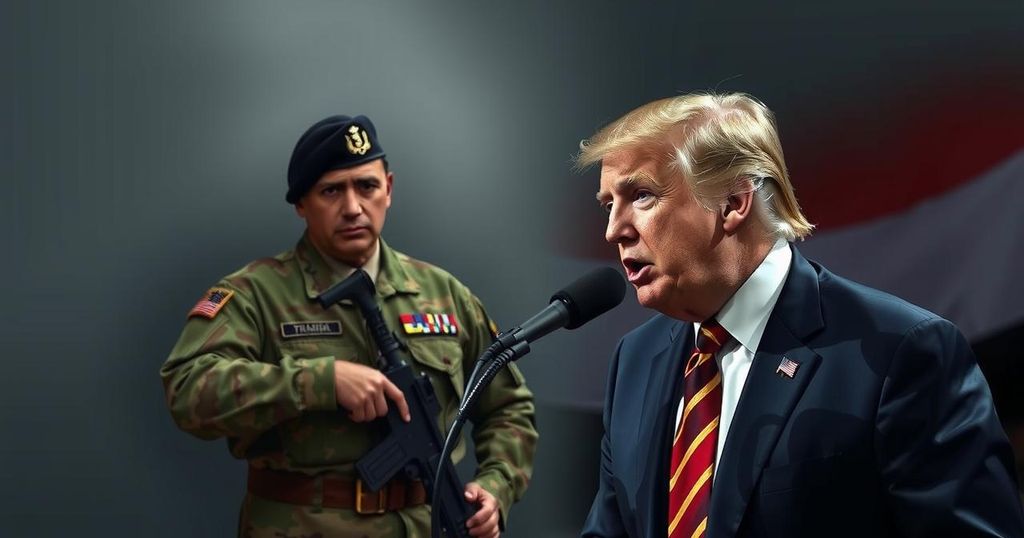World news
ASIA, CONFLICT, EUROPE, EUROPE/ASIA, FIGHTER JETS, IS, ISRAEL, KAMAL, KAMALA HARRIS, KENNEDY, KURDISTAN WORKERS ' PARTY, MIDDLE EAST, MILITARY, NEW MEE, NORTH AMERICA, PALESTINE, REFUGEE CRISIS, ROBERT F KENNEDY, ROBERT F KENNEDY JR, ROBERT F KENNEDY JR DONALD TRUMP, RUSSIA, SDF, SYRIA, SYRIAN DEMOCRATIC FORCES, TRUMP, TRUMP ADMINISTRATION, TUCKER CARLSON, TURKEY, UKRAINE, UNITED STATES, US, WAR
Marisol Gonzalez
0 Comments
Trump’s Desire to Withdraw US Troops from Northern Syria
Robert F. Kennedy Jr. revealed that President Trump plans to withdraw US troops from northern Syria to avoid them becoming casualties amid potential conflicts between Turkey and Kurdish forces. Trump’s remarks stemmed from concerns voiced during a conversation about the risks involved, particularly with significant numbers of troops from Turkey and Syria in the region. This potential policy shift reflects broader concerns about US foreign relations under Trump’s administration.
Donald Trump, the recently re-elected President of the United States, has expressed a desire to withdraw American troops from northern Syria. This perspective was relayed by Robert F. Kennedy Jr. during a live interview with Tucker Carlson, where Kennedy recounted a conversation with Trump regarding the potential dangers American forces could face if conflict erupted between Turkey and Kurdish fighters. Kennedy noted that Trump remarked on the risks of US troops becoming “cannon fodder” in such a scenario, thus advocating for their removal from the region. During his discussion with Kennedy, Trump referred to the positioning of US forces at the Syrian-Turkish border and the complex military landscape in the area. He highlighted the presence of a significant number of Turkish and Syrian troops, noting that the US forces could find themselves trapped between warring factions. The implications of Trump’s plans come at a time of heightened concern among US allies regarding potential shifts in foreign policy, particularly concerning relations with Ukraine and support for Kurdish groups in Syria. Trump’s re-election raises questions about the future of US military involvement in Syria, particularly given that past American administrations had committed to supporting Kurdish forces fighting against the Islamic State. The Kurdish People’s Protection Units (YPG), aligned with the Syrian Democratic Forces (SDF), have faced opposition from Turkey, which views them as an extension of the Kurdistan Workers’ Party (PKK). This backdrop complicates US military strategy, as the region remains volatile with the Syrian government’s aspirations to reclaim lost territories. The situation in northern Syria also includes the custody of thousands of Islamic State fighters by the SDF, further emphasizing the importance of US presence in stabilizing the region against escalating violence and rising Iranian influence. However, the recent remarks by President Trump indicate a significant shift in the administration’s approach to an ongoing and complex military engagement.
The ongoing conflict in Syria has involved numerous factions and foreign actors, complicating the situation on the ground. Since the rise of the Islamic State, the United States has supported the Kurdish forces, particularly the YPG, as part of the broader coalition against extremism. Turkey’s aggressive stance against the YPG, viewing them as a terrorist organization, has led to repeated military incursions into northern Syria. Meanwhile, the conflict has also seen the Syrian government attempting to regain control over territories lost during the civil war. The presence of American troops in this complex scenario has been a matter of significant debate among policymakers, with discussions about their strategic necessity persisting over the years.
In summary, Robert F. Kennedy Jr.’s revelations about President Trump’s intention to withdraw US troops from northern Syria reflect a notable shift in American foreign policy direction under Trump’s re-election. The potential removal of troops raises questions about the future stability of the region, particularly regarding Kurdish forces and ongoing tensions with Turkey. As this situation unfolds, the implications for US commitments abroad and regional dynamics will require careful observation from allies and policymakers alike.
Original Source: www.middleeasteye.net




Post Comment